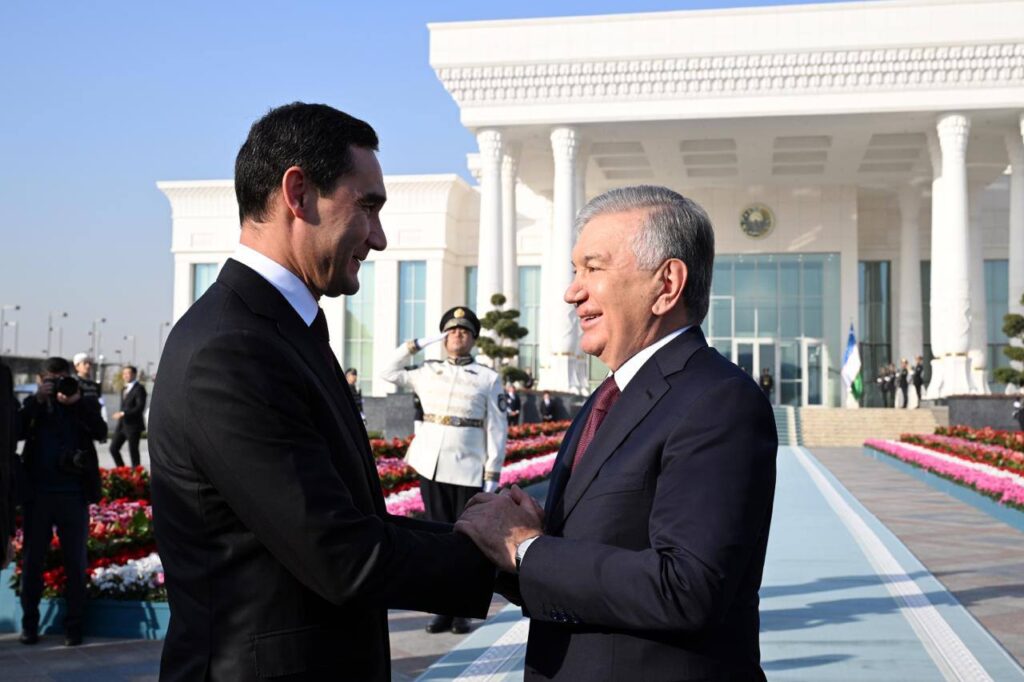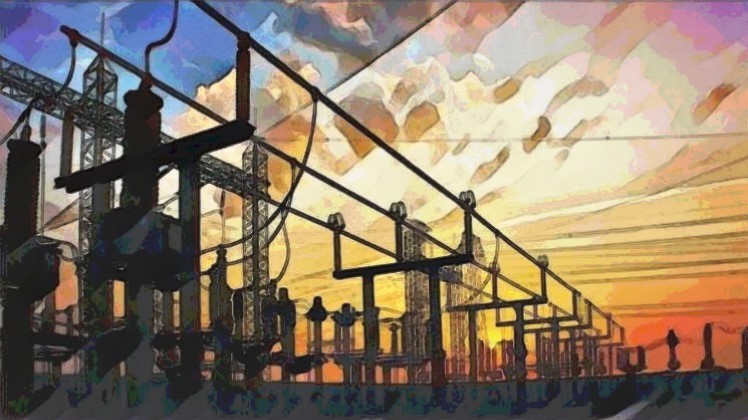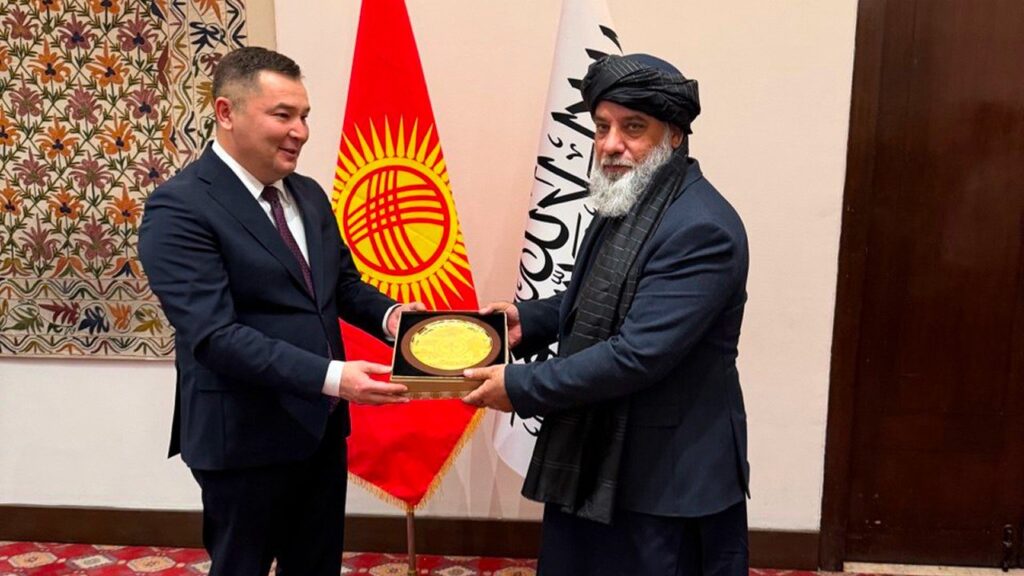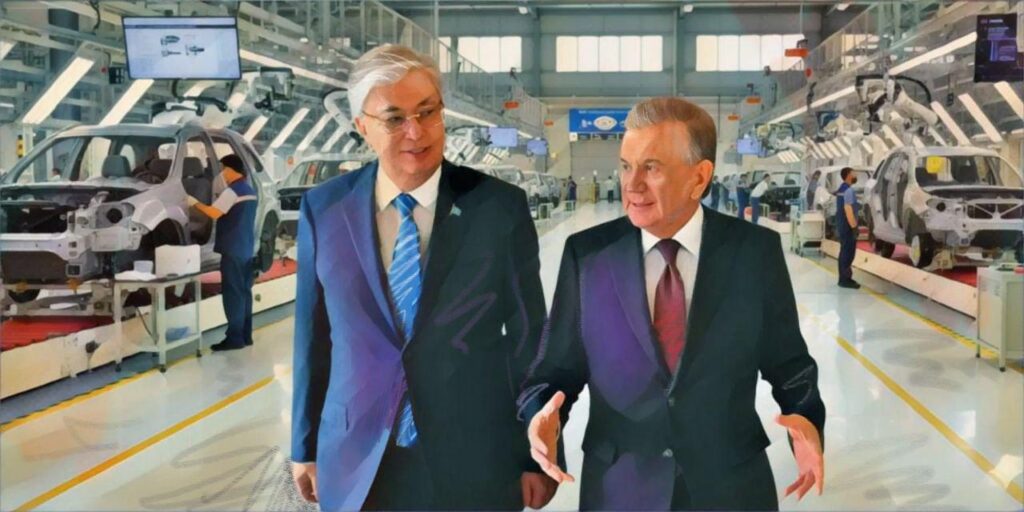BISHKEK (TCA) — The Publisher’s note: Throughout the 19th and 20th centuries, Central Asia was the scene of intense geopolitical struggle and the Great Game between the British and Russian Empires, and later between the Soviet Union and the West, over Afghanistan and neighboring territories. Into the 21st century, Central Asia has become the area of a renewed geopolitical interest, dubbed the New Great Game, largely based on the region’s hydrocarbon and mineral wealth. On top of that, the region now is perhaps the most important node in the implementation of China’s One Belt, One Road initiative through which Beijing aims to get direct access to Western markets. Every week thousands of news appears in the world’s printed and online media and many of them may escape the attention of busy readers. At The Times of Central Asia, we strongly believe that more information can better contribute to peaceful development and better knowledge of this unique region. So we are presenting this Weekly Digest which compiles what other media have reported on Central Asia over the past week.
KAZAKHSTAN
Infographics: Why China Invests in Kazakhstan?
Experts say Kazakhstan needs to use Chinese investments as a launching pad into diversification of national economy
Dec 20 — “According to the National Bank of Kazakhstan, 121 countries have invested in the national economy for 26 years and most of investments have been from the Netherlands, United States, Switzerland, China and United Kingdom. The first three countries have invested more than all other countries in aggregate. According to the economist, researcher of the Norwegian Institute of International Affairs (NUPI), Daniyar Moldokanov, the Netherlands doesn’t have an enemy in Central Asia historically as it doesn’t share a border and has no imperialistic ambitions.” READ MORE: https://cabar.asia/en/infographics-why-china-invests-in-kazakhstan/
Kazakhstan’s leadership opens up to ‘alternative opinion’
Kazakhstan President Kassym-Jomart Tokayev delivered a major agenda-setting speech outlining measures to improve the economy and social standards, but also introducing several democratic reforms
Dec 24 — “The Central Asian country is rich in resources, with a relatively small population and a huge territory, and keen to attract foreign investment. The EU as a whole is the number one investor in Kazakhstan. From the early stage of its post-Soviet transition, Kazakhstan has consolidated strong state power to avoid chaos. Today, as the country is considered successful at home and internationally, this centralisation is being reduced.” READ MORE: https://www.euractiv.com/section/central-asia/news/kazakhstans-leadership-opens-up-to-alternative-opinion/
The U.S. emerging markets opportunity along the Silk Road
The United States must pay more attention to investment competition and influence in places like Kazakhstan
Dec 25 — “Newly released trade figures show that China is feeling the pain in its ongoing economic spat with the United States. Exports are reportedly down for the 12th consecutive month,with trade volumes 1.1 percent below where they were last November. China’s imports actually grew by 0.3 percent last month, despite experts forecasting a 1.4 percent drop in imports. This translated to a trade surplus for China $8 billion below projections.” READ MORE: https://www.washingtontimes.com/news/2019/dec/25/the-us-emerging-markets-opportunity-along-the-silk/
Kazakhstan: encouraging children and adolescents to develop healthy behaviours
To address alarming health issues among young people, the Ministry of Health of Kazakhstan requested WHO’s assistance in scaling up the health promoting schools initiative within the country
Dec 26 — “More than 500 school directors and education and public-health professionals from Kazakhstan participated in WHO’s health promoting schools initiative this year. During a series of capacity-building events in the country’s regions, working groups designated by the schools learned how to conduct a situational analysis using the WHO Schools for Health in Europe (SHE) rapid assessment tool, and how to plan actions based on assessment results and defined priorities.” READ MORE: http://www.euro.who.int/en/countries/kazakhstan/news/news/2019/12/kazakhstan-encouraging-children-and-adolescents-to-develop-healthy-behaviours
KYRGYZSTAN
Saudi Fund for Development Supports the Government of Kyrgyzstan in Developing Key Transportation Projects
Kyrgyzstan badly needs foreign investment for its infrastructure development projects
Dec 23 — “As part of an official Republic of Kyrgyzstan state visit to Saudi Arabia, Dr. Khalid Al-Khudairy, Vice President and Managing Director for the Saudi Fund for Development (SFD), and Mrs. Baktygul Jeenbaeva, Minister of Finance of the Republic of Kyrgyzstan, signed a new infrastructure loan agreement. SFD partnered with the Islamic Development Bank and the Kuwait Fund to contribute to the rehabilitation and improved construction of the 442 km long Lake Issykul Ring Road, which provides access from the Kyrgyz capital city of Bishkek to one of Central Asia’s prime tourism destinations.” READ MORE: https://www.financialbuzz.com/saudi-fund-for-development-supports-the-government-of-kyrgyzstan-in-developing-key-transportation-projects/
Andrey Belyaninov about work with Kyrgyzstan, digitization and green economy
The Eurasian Development Bank’s Chairman Andrey Belyaninov’s interview about cooperation with Kyrgyzstan and promising areas for financing
Dec 24 — “How does 2019 end for EDB? We preliminary reported to the EDB Council on the work of the bank as of the beginning of December. All key indicators that were planned for the year have been fulfilled. I asked the bank’s Council to entrust us with the development of a new strategy, in order we can act more urgently on what is happening in the markets.” READ MORE: https://24.kg/english/138933_Andrey_Belyaninov_about_work_with_Kyrgyzstan_digitization_and_green_economy/
Unsafe City: Why Ramps in Bishkek Are Just For Show?
Bishkek doesn’t have accessible environment for certain groups of people and cannot be called a safe city
Dec 25 — “Mothers with strollers, elderly people with mobility problems, and physically disabled people that use wheelchairs still need to choose routes to make their travel around the city comfortable. “Proper” ramps and stair lifts are not widely accessible in the capital. Speaking of the “properness” of ramps, we should turn to the construction norms and rules (SNiP) of the Kyrgyz Republic. SNiP 35-01-2001 is titled “Accessibility of buildings and structures to mobility impaired groups of people”. READ MORE: https://cabar.asia/en/unsafe-city-why-ramps-in-bishkek-are-just-for-show/
TAJIKISTAN
Arabic Language Courses in Tajikistan: A Silent Ban or Absence of Demand?
Officials in Dushanbe deny any restrictions on the Arabic language study, but those willing to study it, cannot find the suitable courses
Dec 17 — “Mehrangez Tursunzoda, Tajik journalist, searched for Arabic courses for her 12-year-old younger brother. However, according to her, there are no offers for Arabic study in city’s training centers. “My brother fluently speaks Tajik, Russian and English. He is interested in Arabic language and we decided to enroll him in Arabic courses. Unfortunately, we did not find a single training center where this language was taught,” Tursunzoda says.” READ MORE: https://cabar.asia/en/arabic-language-courses-in-tajikistan-a-silent-ban-or-absence-of-demand/
Freedom of Speech in Tajikistan: Don’t Seek, Don’t Ask, Don’t Talk
The main obstacles and threats to the media in Tajikistan are insufficient professional training, self-censorship, insufficient financial resources, poor professional ethics and government interference in the media
Dec 20 — “Without preparation, one can confidently list the negative events or trends that have occurred in the field of Tajik mass media in recent years. It will not be so easy to mention positive evens, mentioned the editor of IWPR in Tajikistan, Marat Mamadshoev. According to data from the Ministry of Culture of Tajikistan, 371 newspapers (109 state-owned, 262 private), 243 magazines (113 state-owned, 130 non-state), 11 news agencies (10 non-state, 1 state-owned), 34 television companies (20 of which are independent) are registered in the republic.” READ MORE: https://cabar.asia/en/freedom-of-speech-in-tajikistan-don-t-seek-don-t-ask-don-t-talk/
A Tajik Business Empire Tied To The President Keeps On Running, Despite Being Shut Down
The president’s son-in-law, Shamsullo Sohibov, controls a vast amount of wealth in Tajikistan
Dec 24 — “Three months ago, the Faroz company was one of the most successful business conglomerates in Tajikistan, controlled by none other than President Emomali Rahmon’s wealthy son-in-law, Shamsullo Sohibov. But at the height of that success, Faroz dropped a bombshell and announced it would shut down due to tough market conditions and dwindling profits.” READ MORE: https://www.rferl.org/a/family-ties-tajik-style-presidential-son-in-law-s-business-empire-still-active-despite-shut-down-claim/30342381.html
TURKMENISTAN
Turkmen entrepreneurs complain that customers head to the flea markets
The Turkmen market is rapidly shrinking because of large-scale labour migration, insolvency of residents and customers leaving for flea markets
Dec 20 — “It has been previously reported that in recent years due to an economic slump, flea market selling second hand clothes and used items have become popular. According to correspondents of “Chronicles of Turkmenistan”, women with children knock on the doors of apartments and ask the inhabitants to sell for a nominal fee or give away unused kitchen utensils, household tools, books and clothes, which they later resell in the markets.” READ MORE: https://en.hronikatm.com/2019/12/turkmen-entrepreneurs-complain-that-customers-head-to-the-flea-markets/
Turkmenistan targets roadshows to attract foreign oil players
Series of events set to kick off early next year in Dubai, with London also on cards
Dec 24 — “Turkmenistan is gearing up to try to attract international players to explore and develop resources in its portion of the Caspian Sea, with a series of roadshows planned for next year. State entities for oil, gas and geology Turkmengas, Turkmennebit and Turkmengeology are, with support from UK energy consultancy Gaffney, Cline & Associates, launching the international roadshows beginning in the first quarter.” READ MORE: https://www.upstreamonline.com/exploration/turkmenistan-targets-roadshows-to-attract-foreign-oil-players/2-1-729743
Customs officers coerce bribes for giving access to Turkmen trucks loaded with tomatoes for export
Corruption is widespread in Turkmenistan’s customs agency
Dec 25 — “Not only Russian Federal Service for Veterinary and Phytosanitary Surveillance, which destroys the vegetables infested with pests, but also the Turkmen customs office hinders the export of tomatoes from Turkmenistan to Russia. A fee of $150 is coerced from each refrigerated van by customs officers who keep vigil at the border checkpoint Farab-avtodorozhny.” READ MORE: https://en.hronikatm.com/2019/12/customs-officers-coerce-bribes-for-giving-access-to-turkmen-trucks-loaded-with-tomatoes-for-export/
UZBEKISTAN
Freedom with Disclaimers: How Does the Mass Media of Uzbekistan Work?
For many years, there were practically no political and economic media, and practically no social issues were raised in Uzbekistan
Dec 23 — “Since 2016, Uzbekistan has embarked on the modernization and liberalization of the state. According to statements from the rostrum, these changes affect all sectors of life, including journalism – the new government declared that it wants to see free and strong media. However, it is still not clear to which extent these statements are backed up by actions, and is the administration of Mirziyoyev really interested in emergence of the fourth power.” READ MORE: https://cabar.asia/en/freedom-with-disclaimers-how-does-the-mass-media-of-uzbekistan-work/
Uzbekistan election delivers humdrum result but major expectations
The challenge for parties allowed to compete in the parliamentary election was not winning, but living up to new expectations
Dec 23 — “Uzbekistan has now voted in a parliamentary election that the government and the international community alike hailed as an opportunity to bolster the country’s tentative embrace of democracy. For all that enthusiasm, early results suggest the next legislature could be a near-facsimile of the one it’s replacing. Even champions of the process concede this was, at best, a practice run for the real thing.” READ MORE: https://eurasianet.org/uzbekistan-election-delivers-humdrum-result-but-major-expectations
Uzbekistan bans citizens from buying cryptocurrencies
The decision comes as a surprise to many, as the country has previously displayed a relatively lenient stance toward digital currencies
Dec 25 — “The government of Uzbekistan has reportedly barred its citizens from purchasing cryptocurrencies. According to local news outlet Novosti Uzbekistana on Dec. 25, the National Project Management Agency has banned citizens from purchasing crypto, even on established exchanges.” READ MORE: https://cointelegraph.com/news/uzbekistan-bans-citizens-from-buying-cryptocurrencies
AFGHANISTAN
U.S. Fights an Islamic State Rise in Afghanistan
ISIS-Khorasan draws funding, fighters from Islamic State operations in Iraq and Syria, fueling a militant push into Asia
Dec 26 — “Islamic State in Afghanistan has become the strongest branch of the militant group outside of Iraq and Syria, according to U.S. officials, posing a persistent threat despite a U.S.-led offensive and the killing in October of leader Abu Bakr al-Baghdadi.” READ MORE: https://www.wsj.com/articles/u-s-fights-an-islamic-state-rise-in-afghanistan-11577386725
American University of Afghanistan could close next year if federal funding is cut
The university relies on the US Agency for International Development for more than 60% of its budget and could not operate without the agency’s financial backing
Dec 27 — “The American University of Afghanistan is drawing up plans to shut down next year, a casualty of anticipated US government budget slashing of the school’s steady stream of funding, three sources familiar with the planning tell CNN. The university is widely regarded as a top university in Afghanistan and the only one that provides a Western-style education. Established in 2006, the school now has a student body that is about half female and presents an important opportunity for women, who the Taliban once forbid from going to school. Many of its graduates have gone on to serve in the Afghan government.” READ MORE: https://edition.cnn.com/2019/12/26/politics/american-university-afghanistan-closing-plans/index.html
Poisonings, Assassination, And A Coup: The Secret Soviet Invasion Of Afghanistan
The Soviet decision to topple Amin was a shock, including to the Kabul regime, which had forged close ties with Moscow since communists seized power after a bloody coup in 1978
Dec 27 — “Afghanistan’s communist President Hafizullah Amin was lying unconscious in his bed. A KGB agent who had infiltrated Amin’s staff as a cook had poisoned the president and his ministers during lunch at the Tajbeg presidential palace in Kabul. It was December 27, 1979. Two Soviet doctors, unaware of the KGB plot, worked desperately to revive Amin at the palace. His ministers were rushed to a military hospital.” READ MORE: https://www.rferl.org/a/poisonings-assassination-and-a-coup-the-secret-soviet-invasion-of-afghanistan/30347141.html
WORLD
China’s Central Asian Plans Are Unnerving Moscow
China’s push into Central Asia through Belt and Road-linked investment projects has made Central Asia into a geopolitical laboratory
Dec 23 — “On the China-Kazakhstan border, flanked by snowcapped peaks, a highway cuts through a barren landscape to reach this terminal at Khorgos. Here, amid a collection of cranes, rail tracks, and warehouses, a growing town is poised to become a bustling inland transport hub and a vital link in China’s vast and battered Belt and Road Initiative. Khorgos is roughly 1,550 miles from the nearest coastline, but developers have dubbed the site a “dry port,” a terminal designed to process overland cargo. It began operating in 2015 and has seen steady growth.” READ MORE: https://foreignpolicy.com/2019/12/23/china-russia-central-asia-competition/
Central Asia’s domestic conundrum
Demographic change and the rise of the next generation will continue to pose significant challenges for Central Asian regimes in the coming year, particularly for the Soviet-era elites who continue to rule the region but remain targets of popular resentment
Dec 24 — “Almost 30 years after the collapse of the USSR, Central Asian citizens are growing tired of stagnating economies, rampant corruption and their governments’ empty promises. In 2019, they made it clear they want something better — improved services, more transparency in decision-making and better opportunities for themselves and their children. Like many others across the globe, Central Asians are also demanding fresh leaders, solutions to their problems and a chance for their opinions to be heard.” READ MORE: https://www.eastasiaforum.org/2019/12/24/central-asias-domestic-conundrum/








